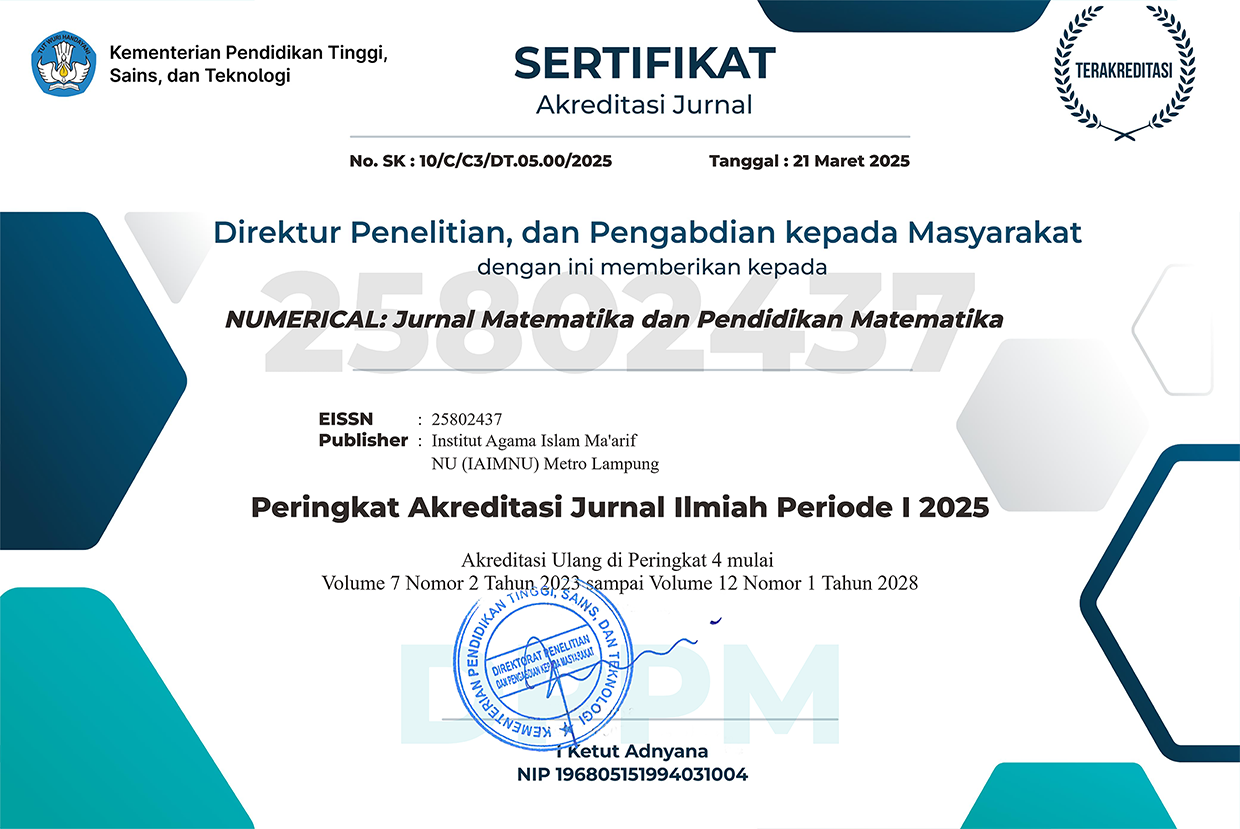E-Module Based on Flip PDF Corporate of Integer Materials to Improve Mathematics Learning Outcomes Elementary School
DOI:
https://doi.org/10.25217/numerical.v6i2.2654Keywords:
Development, E-Module, Flip Pdf Corporate, IntegerAbstract
The aims of this study were (1) to find out the feasibility of the module with Flip PDF Corporate on integers for class VI SD students in class VI SD, (2) to find out the practicality of modules with Flip PDF Corporate on integers for class VI SD students in class VI SD and (3) find out the effectiveness of the module with Flip PDF Corporate on integer grade VI SD students in grade VI SD. This type of research uses a development research model known as R&D (Research and Development) using Sugiyono's development model with the following steps: (1) potential and problems; (2) data collection; (3) product design; (4) design validation; (5) design revisions; (6) product trials; (7) product revisions; (8) trial use. The subjects in this study were students of class VI at SDN Tlogorejo 2 and students of class VI at SDN Sidomulyo 2, Wonosalam District, Demak Regency. We collected data using observation, interviews, questionnaires, and tests. The data analysis technique in this study was to find the average rating of all validators, find the average student response to the module and test the independent sample t test. The results showed that 1) the e-module using flip PDF corporate in mathematics learning integer material is feasible to use, (2) the response of teachers and students gives a positive response to the use of the e-module flip PDF corporate based and (3) the application of flip PDF corporate based on the experimental class gave better learning outcomes than the control class.
References
Purwanto, Evaluasi Hasi Belajar. Surakarta: Pustaka Pelajar, 2019.
Sumaji, “Fektivitas Pembelajaran Matematika Dengan Model Group Investigation Pada Materi Bilangan Bulat Dan Pecahan Kelas Vii Mts Al Anwar Sarang Kabupaten Rembang Ditinjau Dari Aktivitas Belajar Siswa,” vol. 1, no. 1, pp. 32–40, 2014.
Sumaji and Ahmad Abdul Chamid, Evaluasi pemb, x. surabaya: tiga serangkai, 2020.
Sumaji and henry suryo Bintoro, “nuki,” aksioma, vol. 1, no. 1, pp. 22–40, 2022.
R. U. Albab, S. Wanabuliandari, and S. Sumaji, “Pengaruh Model Problem Based Learning Berbantuan Aplikasi Gagung Duran Terhadap Kemampuan Pemecahan Masalah Siswa,” AKSIOMA J. Progr. Stud. Pendidik. Mat., vol. 10, no. 3, p. 1767, 2021.
S. Muhammad Ali Ridho, Jayanti Putri Purwaningrum, “EFEKTIFITAS Pendekatan Saintifik Berbantuan Media Application Ethno-Trigono Untuk Meningkatkan Kemampuan Komunikasi Matematis Siswa Sma 2 Bae Kudus,” vol. 7, no. 2, pp. 14–24, 2022.
A. Ahmad, S. S. Salim, and R. Zainuddin, “MINDA: A cognitive tool for fraction word problem solving,” Proc. - Int. Symp. Inf. Technol. 2008, ITSim, vol. 2, no. 4, 2008.
S. Salma Nafisa Salsabila, F. Shoufika Hilyana, “Analisis Perhatian Orang Tua Terhadap Prestasi,” vol. 7, pp. 1–13, 2004.
S. Kelas, V. Di Sekolah, E. Ekawati, and S. Utaminingsih, “Efektivitas Model Guided Inquiry Learning Dan Model Blended Learning Terhadap Kemampuan Komunikasi Matematis Pada,” vol. 5, no. 1, 2022.
I. Atmaji, R. D., & Maryani, “Pengembangan E-Modul Berbasis Literasi Sains Materi Organ Gerak Hewan dan Manusia Kelas V SD,” Fundam. Pendidik. Dasar, vol. 1, no. 1, pp. 28–34, 2018.
Sumaji, “The Mathematical Communication Failure of The Students While Solving Problems Reviewed From Their Characteristics,” J. Math Educ. Nusant. Wahana Publ. Karya Tulis Ilm. di Bid. Pendidik. Mat., vol. 7, no. 1, pp. 81–88, 2021.
I. D. Irawati, S. Wanabuliandari, and S. Sumaji, “Pengembangan Aplikasi Kreasi Berbasis Local Wisdom Untuk Siswa Kelas Vii,” JIPMat, vol. 7, no. 1, pp. 55–71, 2022.
H. Budiman, “Peran Teknologi Informasi Dan Komunikasi Dalam Pendidikan,” Al-Tadzkiyyah J. Pendidik. Islam, vol. 8, no. 1, p. 31, 2017.
Daryanto, Media Pembelajaran. Yogyakarta: Gava Media, 2021.
Sugiyono, Metode Penelitian Pendidikan: Pendekatan Kuantitatif, Kualitatif, dan R&D. Bandung: Alfabeta, 2015.
F. Ferdianto, Setiyani, and D. Nurulfatwa, “3D page flip professional: Enhance of representation mathematical ability on linear equation in one variable,” J. Phys. Conf. Ser., vol. 1188, no. 1, 2019.
Farida et al., “Development of Interactive Mathematics E-Module Using Visual Studio,” J. Phys. Conf. Ser., vol. 1467, no. 1, 2020.
S. A. Wibowo, - Murtono, - Santoso, and S. Utaminingsih, “Efektifitas Pengembangan Buku Ajar Berbasis Nilai-Nilai Karakter Multikultural Terhadap Keterampilan Berpikir Kritis Siswa,” Sch. J. Pendidik. dan Kebud., vol. 11, no. 1, pp. 54–62, 2021.
Sumaji, “Pengembangan perangkat pembelajaran matematika dengan model pembelajaran pemecahan masalah untuk meningkatkan kemampuan penalaran matematis,” Pros. Semin. Nas. Mat. dan Pendidik. Mat. UMS 2015, pp. 966–974, 2015.
A. Indriasih and S. Sumaji, “Pengaruh Keterampilan Motorik di Sekolah dan Rumah terhadap Kreativitas Anak Usia Dini,” ThufuLA J. Inov. Pendidik. Guru Raudhatul Athfal, vol. 9, no. 1, p. 175, 2021.
Downloads
Published
How to Cite
Issue
Section
License
Copyright (c) 2022 Sunaryo, Sri Utaminingsih, Fitri Budi Suryani, Sumaji

This work is licensed under a Creative Commons Attribution-ShareAlike 4.0 International License.











